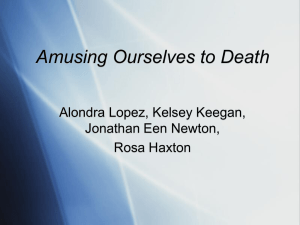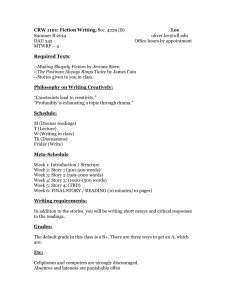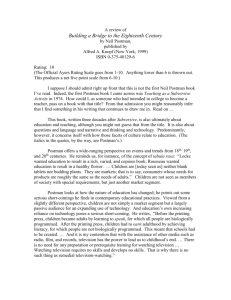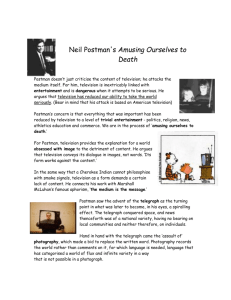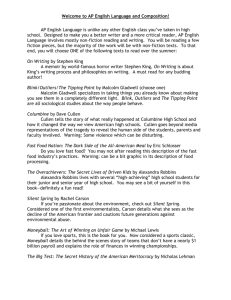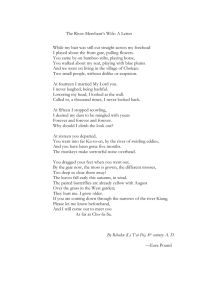Amusing Ourselves to Death Reaction Paper
advertisement
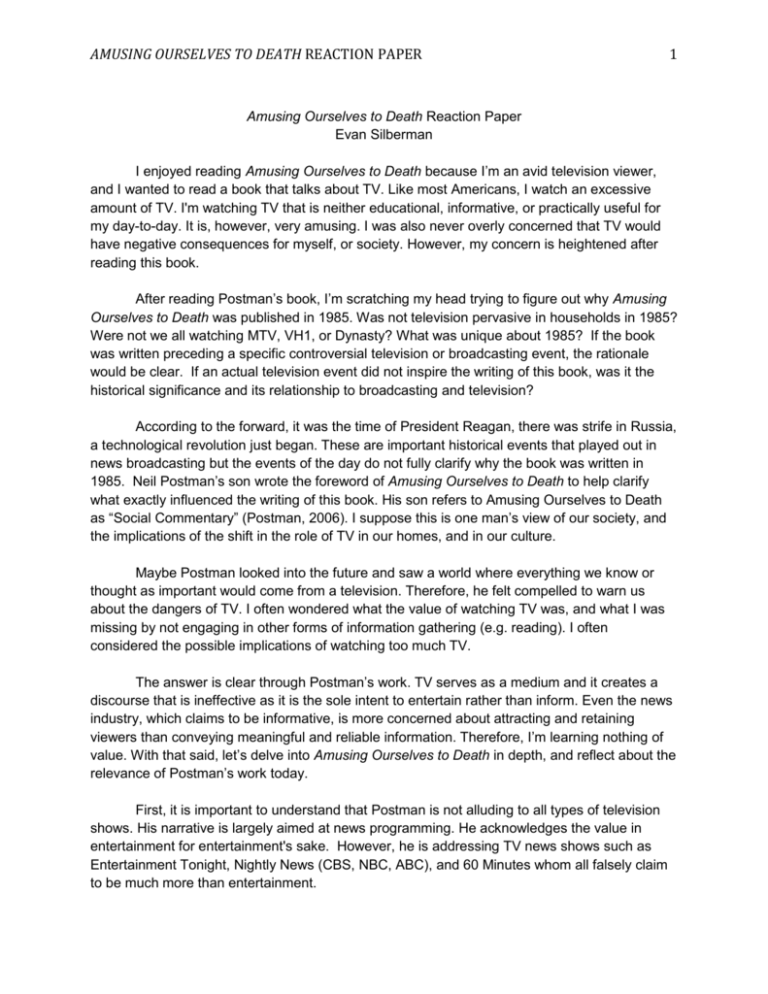
AMUSING OURSELVES TO DEATH REACTION PAPER 1 Amusing Ourselves to Death Reaction Paper Evan Silberman I enjoyed reading Amusing Ourselves to Death because I’m an avid television viewer, and I wanted to read a book that talks about TV. Like most Americans, I watch an excessive amount of TV. I'm watching TV that is neither educational, informative, or practically useful for my day-to-day. It is, however, very amusing. I was also never overly concerned that TV would have negative consequences for myself, or society. However, my concern is heightened after reading this book. After reading Postman’s book, I’m scratching my head trying to figure out why Amusing Ourselves to Death was published in 1985. Was not television pervasive in households in 1985? Were not we all watching MTV, VH1, or Dynasty? What was unique about 1985? If the book was written preceding a specific controversial television or broadcasting event, the rationale would be clear. If an actual television event did not inspire the writing of this book, was it the historical significance and its relationship to broadcasting and television? According to the forward, it was the time of President Reagan, there was strife in Russia, a technological revolution just began. These are important historical events that played out in news broadcasting but the events of the day do not fully clarify why the book was written in 1985. Neil Postman’s son wrote the foreword of Amusing Ourselves to Death to help clarify what exactly influenced the writing of this book. His son refers to Amusing Ourselves to Death as “Social Commentary” (Postman, 2006). I suppose this is one man’s view of our society, and the implications of the shift in the role of TV in our homes, and in our culture. Maybe Postman looked into the future and saw a world where everything we know or thought as important would come from a television. Therefore, he felt compelled to warn us about the dangers of TV. I often wondered what the value of watching TV was, and what I was missing by not engaging in other forms of information gathering (e.g. reading). I often considered the possible implications of watching too much TV. The answer is clear through Postman’s work. TV serves as a medium and it creates a discourse that is ineffective as it is the sole intent to entertain rather than inform. Even the news industry, which claims to be informative, is more concerned about attracting and retaining viewers than conveying meaningful and reliable information. Therefore, I’m learning nothing of value. With that said, let’s delve into Amusing Ourselves to Death in depth, and reflect about the relevance of Postman’s work today. First, it is important to understand that Postman is not alluding to all types of television shows. His narrative is largely aimed at news programming. He acknowledges the value in entertainment for entertainment's sake. However, he is addressing TV news shows such as Entertainment Tonight, Nightly News (CBS, NBC, ABC), and 60 Minutes whom all falsely claim to be much more than entertainment. AMUSING OURSELVES TO DEATH REACTION PAPER 2 Amusing Ourselves to Death examines how American discourse changed from one shaped by a society of writing to that of entertainment. He begins the story in Las Vegas, perhaps the most entertaining city in the world. Las Vegas is representative of everything Postman attributes to TV, and his book explains how we ended up with media whose primary contribution to society is entertainment. According to Postman, the media are metaphors for discourse. The alphabet, the telegraph, and writing are all examples of mediums that shaped the conversational tone in America at one time or another. The alphabet helped structure language, writing formed a means of communication that is highly structured, and lends itself to deep analysis, and the telegraph creates information sharing as a commodity. Each new technology “has an idea embedded in it that extends beyond the functionality of the tool” (Postman, 2006). With TV, it is the idea of entertainment. Furthermore, Postman talks about the new epistemology of media, which transforms as the print culture declines. The new epistemology of TV, Postman says, is inferior to print, diminishes the value of the society, and pollutes the nations dialogue. “My argument is limited to saying that a major new medium changes the structure of discourse; it does so by encouraging certain uses of the intellect, by favoring certain definitions of intelligence and wisdom, and by demanding a particular kind of content—in a phrase, by creating new forms of truth-telling” (Postman, 2006). In other words, TV creates a form of knowing that is discreditable, not truthtelling at all. This form of expression is biased towards non-intelligent content. Postman’s main comparison for his entire argument is that in the age of typographic America, a time when writing was prolific, and the primary discourse, we had more intelligent, thought provoking discussions. Writing is a serious medium, one which requires critical thinking, is structured, and has ‘propositional’ content. As technology became available - from the printing press to the telegraph, to the television - the way we communicated changed. Communication was no longer truth conveying. Furthermore, the way we think about information changed. It is as if we went from engaging and well thought out dialogue to snippets of information with little to no depth or substance. Postman uses the example of, the newspaper, newsletters, and pamphlets, than the telegraph. With each new media, America moved further away from the structured discourse writing provided. The telegraph was especially notable because the information was coming from a place unrelated to one's geographic location. In some respects, this established a model for TV. Everything that was shared was in snippets, and it was across time and space. The telegraph can be compared to Facebook, Twitter, or Instagram today. It is possible to communicate with people regardless of their location, but If you are not the sender or recipient the content is either entirely lost or superficial and frivolous. Communication outside of the printed word is meaningless without context. The further away we are from thinking in a typographic mindset, the closer we are to discourse shaped by less effective media. The media are also a form of TV, and as a medium Postman says it is only providing us imagery that is for amusement and pleasure. I think the clearest demonstration that Postman AMUSING OURSELVES TO DEATH REACTION PAPER 3 makes of this is the news, and I agree with his position. I’m not stating this from the perspective of a consumer of TV news. I have witnessed this first hand. My Aunt had a long career in the news industry. She won many awards during her tenure as news director, and I spent many mornings visiting her at work, hearing stories of her business, and meeting her news anchors and staff. From my observations and our conversations, it is very clear to me that TV news is nothing but entertainment and show business as Postman describes. It is truly a ‘Now...This’ world. There is money tied to ratings; TV news personalities are treated like celebrities (with an annual wardrobe expense account), and productions are most concerned with entertaining the public rather than conveying truth. The irony for me is that while my Aunt’s livelihood was news, and I could watch her morning TV show, I never did. I find the news to be grim, depressing, and uninformative. I’ve never had a meaningful conversation about a news segment after watching it. If anything, I’ve witnessed my aunt became fearful of the world after years of producing TV about it. Anytime I’d tell her about a vacation, or share a story about the NYC subway, she would respond with a story about the worst possible thing that ever happened on a cruise ship, or train, or plane, or highway. After all, my only real interest in her show was the celebrities that often were on it. Even if most of the broadcast were news oriented, it would not matter. The segments that are hard news are delivered in such brevity the depth of knowledge one gains by watching is minimal. It is like reading a headline of the New York Times, and thinking that is the whole story. From my experience, everything Postman says about TV is true, and we now have the added challenge of the Internet and Social Media. I wonder how Postman would respond to the new media of today, and the anticipated media of the future. Would TV be his primary concern? Would he have the same theory about computers, the Internet, and social media? What about Internet connected TV sets? Would he react adversely to the fact I read his book on an iPad rife with entertaining distractions? I think so because his message is relevant today. With all the distractions that our screens provide, there is something very inauthentic about the conversation they create. How much information is available through a text message or social media application? How many times was a conversation unclear, or fell short of being meaningful because it was 140 characters or fewer? I know some of our devices make content more accessible, but most of that content is still for amusement. Postman offers solutions for reversing the amusing discourse TV creates. His primary recommendation is to use education to inform children how to interpret TV and computers. After all, TV is a symbol of culture, according to Postman, and it’s the job of educators to teach the youth how to interpret these symbols. Postman is suggesting reforming education, when there are already many challenges in the education system. The focus for most students needs to be more practical, such as learning how to use computers and other technology as a skill. I think it is within the context of learning how to use technology as a tool that a teacher can teach youth how to think about these tools. AMUSING OURSELVES TO DEATH REACTION PAPER 4 Postman spends time in the book focusing on how the discourse of television is problematic for education. He implies that education too is more about entertaining students than teaching for learning. I think he is referring to the “sage on the stage” (i.e. lecturer) making his or her lecture amusing, and making an entertaining presentation the main priority of teaching. Clark and Kozma discussed the relationship between media and learning. What is the relationship: Is it the instructional methods and aspects of learning, or the technology, characteristics, and symbols of media? I think Postman would suggest it is the technology, characteristics, and symbols of TV that relate to learning. After all, his suggestion is to flip the education system to teach youth how to interpret the symbols of a culture. The technology is simply a medium, but it is the characteristics and symbols of the medium that, according to Postman, shape the message and discourse. To conclude, American society shifted from a typographic mindset to a world of amusement. This transition changed the cultural discourse from one of coherence and truth telling, to one that is non-contextualized and non-intelligent. We are now an America that is being amused by media instead of being informed and educated by it. This is now pervasive in the education system, and the primary way to reverse it is by teaching children how to think about the symbols of discourse. Postman, N. (2006). Amusing ourselves to death: public discourse in the age of show business. New York, N.Y., U.S.A.: Penguin Books.
